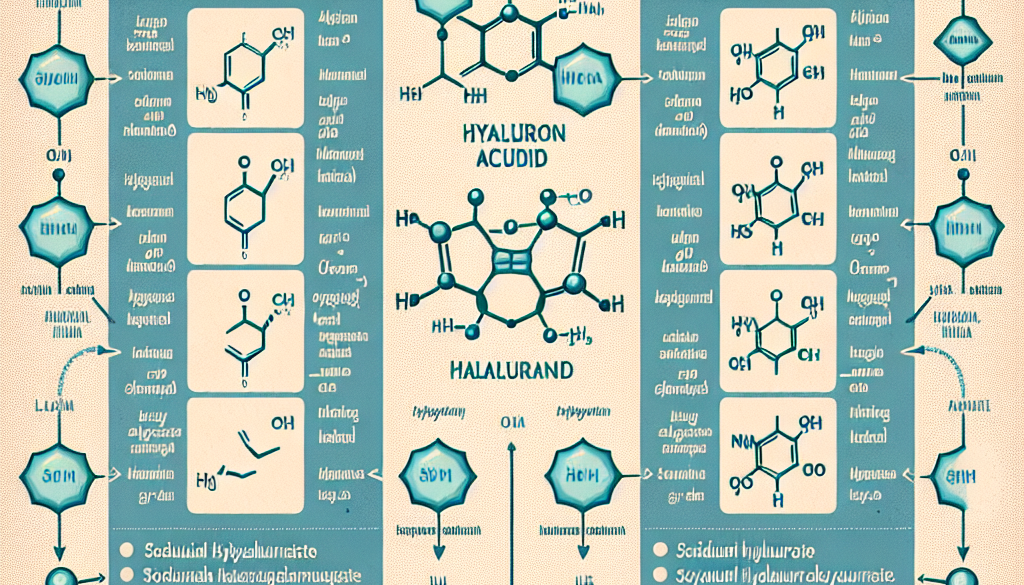Sodium Hyaluronate vs Hyaluronic Acid: Key Differences
-
Table of Contents
- Sodium Hyaluronate vs Hyaluronic Acid: Exploring Key Differences
- Understanding the Basics
- What is Hyaluronic Acid?
- What is Sodium Hyaluronate?
- Key Differences Between Sodium Hyaluronate and Hyaluronic Acid
- Molecular Weight and Penetration
- Hydration and Moisturization
- Stability and Longevity
- Applications in Cosmetics and Medicine
- Choosing Between Sodium Hyaluronate and Hyaluronic Acid
- Conclusion
- Explore ETprotein’s Protein Products
Sodium Hyaluronate vs Hyaluronic Acid: Exploring Key Differences
In the world of skincare and medical treatments, two compounds frequently discussed are sodium hyaluronate and hyaluronic acid. Despite their similar names and related benefits, these substances have distinct properties, applications, and effects. This article delves into the key differences between sodium hyaluronate and hyaluronic acid, providing a comprehensive understanding of each to help you make informed decisions about their use.
Understanding the Basics
Before exploring the differences, it’s essential to understand what these compounds are and why they are significant in various industries, particularly in skincare and medicine.
What is Hyaluronic Acid?
Hyaluronic acid (HA) is a naturally occurring polysaccharide found in the human body, primarily within the skin, eyes, and connective tissues. Its main function is to retain water to keep tissues well lubricated and moist. HA is renowned for its incredible ability to hold up to 1000 times its weight in water, making it a vital component in moisturizing products.
What is Sodium Hyaluronate?
Sodium hyaluronate is a salt derived from hyaluronic acid. It shares many of the same benefits as HA but has a lower molecular weight, which allows it to penetrate the skin more easily. This characteristic makes sodium hyaluronate a popular ingredient in skincare products, where deeper absorption can lead to more pronounced benefits.
Key Differences Between Sodium Hyaluronate and Hyaluronic Acid
While sodium hyaluronate and hyaluronic acid are related, their differences in molecular structure lead to varied uses and effects in skincare and medical treatments.
Molecular Weight and Penetration
The primary difference between sodium hyaluronate and hyaluronic acid lies in their molecular weight. Sodium hyaluronate typically has a much lower molecular weight, which not only allows it to penetrate the skin more effectively but also makes it less likely to cause allergic reactions or irritation. This makes it particularly beneficial for those with sensitive skin.
Hydration and Moisturization
Both compounds are excellent at hydrating the skin, but their methods of action and effectiveness differ slightly. Hyaluronic acid forms a layer on the skin’s surface, which helps to prevent moisture loss and keeps the skin hydrated from the outside. In contrast, sodium hyaluronate can penetrate deeper into the dermal layer, providing moisture from within and improving the skin’s plumpness and elasticity over time.
Stability and Longevity
Sodium hyaluronate is generally more stable than hyaluronic acid. This stability extends its shelf life and maintains its effectiveness in skincare products over time. Additionally, because sodium hyaluronate can penetrate the skin more deeply, its hydrating effects are often longer-lasting compared to those of hyaluronic acid.
Applications in Cosmetics and Medicine
Both compounds are widely used in cosmetics, but their applications extend beyond simple skincare. Hyaluronic acid is often used in injectable form for its anti-aging properties, helping to fill wrinkles and support facial structures. Sodium hyaluronate, due to its smaller molecular size, is preferred in topical treatments to soothe, hydrate, and repair the skin.
Choosing Between Sodium Hyaluronate and Hyaluronic Acid
Choosing between sodium hyaluronate and hyaluronic acid depends largely on your specific needs:
- Skin Type: Sodium hyaluronate is generally better for sensitive or acne-prone skin due to its lower molecular weight.
- Desired Effects: For surface hydration and visible plumping, hyaluronic acid is ideal. For deeper hydration and long-term benefits, sodium hyaluronate may be preferable.
- Product Formulation: Consider the other ingredients in the product. For instance, products with both compounds can provide both immediate and lasting hydration benefits.
Conclusion
While both sodium hyaluronate and hyaluronic acid offer significant benefits for skin hydration and health, their differences in molecular weight, penetration, and stability make them suitable for different applications. Understanding these key differences can help you choose the right product for your skincare needs, ensuring optimal results and satisfaction.
Explore ETprotein’s Protein Products
After enhancing your skincare routine with the right hyaluronic product, consider boosting your health with high-quality protein supplements from ETprotein. This reputable manufacturer offers a wide range of organic and allergen-free protein products perfect for various dietary needs and health goals.
ETprotein is Sodium hyaluronate Factory Manufacturer and Supplier in China, Check further information by visiting the Sodium hyaluronate Product Page
Sodium hyaluronate Product Page
Request Quotation and Samples of Sodium hyaluronate from ETprotein
About ETprotein
ETprotein, a reputable protein and elite nutrition ingredients Sodium hyaluronate Chinese factory manufacturer and supplier, is renowned for producing, stocking, exporting, and delivering the highest quality organic bulk vegan proteins and elite nutritional ingredients Sodium hyaluronate. They include Organic rice protein, clear rice protein, pea protein, clear pea protein, watermelon seed protein, pumpkin seed protein, sunflower seed protein, mung bean protein, peanut protein. Their offerings, characterized by a neutral taste, non-GMO, allergen-free attributes, cater to a diverse range of industries. They serve nutraceutical, pharmaceutical, cosmeceutical, veterinary, as well as food and beverage finished product distributors, traders, and manufacturers across Europe, USA, Canada, Australia, Thailand, Japan, Korea, Brazil, and Chile, among others.
ETprotein specialization includes exporting and delivering tailor-made protein powder and finished nutritional supplements. Their extensive product range covers sectors like Food and Beverage, Sports Nutrition, Weight Management, Dietary Supplements, Health and Wellness Products, and Infant Formula, ensuring comprehensive solutions to meet all your protein needs.
As a trusted company by leading global food and beverage brands and Fortune 500 companies, ETprotein reinforces China’s reputation in the global arena. For more information or to sample their products, please contact them and email sales(at)ETprotein.com today.














